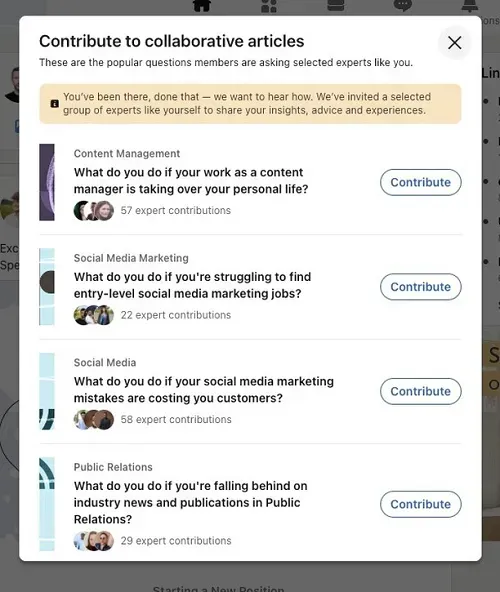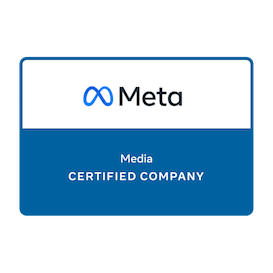Marketing Trend Tracker - Series 9
This month has ushered in notable shifts within the digital marketing sphere, marked by significant updates from platforms LinkedIn and X, and a proposed federal privacy act aimed at transforming how businesses handle data collection, usage, and sharing. These changes are not just altering user engagement strategies but are also setting new precedents for content creation and online interaction. Let's explore these changes and their potential impact on the future of digital marketing.
LinkedIn's Collaborative Articles
Since its
release in March 2023, LinkedIn’s “Collaborative Articles” have witnessed a quadruple increase in weekly member contributions. They have also seen a
270% surge in weekly readership since September. Utilizing a blend of AI-powered technology and user contributions, this innovative feature was aimed at fostering collaboration among users, allowing them to work together on articles and share their collective insights with a wider audience. These statistics underscore a significant uptick in the platform’s interactive and content-rich environment, attributed to features that translate into increased value for members.
Building on the success of these articles, LinkedIn recently added a new shortcut within its post composer specifically tailored for these collaborative articles. This addition has made it even easier for users to engage with the collaborative articles feature, streamlining the process of co-creation and sharing on the platform.
In addition, users can earn a "Community Top Voice" badge. This badge is not just a mark of recognition; it symbolizes a user’s credibility and stature within their professional community on LinkedIn. To be in contention, users need to position themselves within the top 5% of contributors for a specific skill and be among the first 2,500 badge holders. This gamification aspect has spurred a remarkable increase in user
engagement, with many striving to showcase their skills and insights.


Source: Social Media Today
X's Strategic Shift with New Account Fee
X has taken a bold step to refine its user base and enhance the quality of engagement on the platform by introducing an annual fee for new accounts to be able to post, bookmark, or engage with other posts/accounts. This decision, announced by Elon Musk, aims to combat the relentless bot activity plaguing the platform. While browsing remains free, active participation now comes with a cost for new users, a move that exempts existing account holders.
This strategic shift is a key part of X's wider strategy to address significant drop in ad revenue. Since Elon Musk's takeover in April 2022, the platform has been in a state of flux, with its
reliance on advertising sales making it particularly vulnerable.
Controversies stemming from Musk's tweets, reversals on previously banned accounts, and concerns over content moderation have further alienated advertisers. The resulting 60%
plunge in U.S. advertising revenue as of September has raised alarms over the platform's financial health, prompting Musk to
acknowledge the urgency of the issue.

Source: X
In response, X tested the "Not a Bot" program, which introduced a $1 USD annual fee for account creation in New Zealand and the Philippines back in October 2023. This pilot required new users to undergo a two-step verification process, comprising phone and payment verification, to authenticate their identity. This initiative represents X's commitment to ensuring a more genuine and bot-free user experience.
Besides X, other social media platforms are adopting a paid approach. In December of 2023, Meta introduced a paid ad-free subscription service in the European Union, adapting to the new requirements set by the Digital Markets Act and GDPR, which aim to enhance user privacy and choice. Meta’s subscription adheres to EU regulations by offering users the option to decide if their data can be collected and used for targeted advertising. Those who use the free service, however, must agree to data tracking. This trend of adopting paid alternatives by Meta and X signifies a wider transformation in social media platforms as they adapt to regulatory and economic challenges in the digital landscape.
If the American Privacy Rights Act of 2024 (APRA) is passed in the United States, it could pave the way for a similar service offering stateside. Such legislation would likely compel major social media platforms to offer more control over personal data and advertising exposure, potentially leading to the expansion of ad-free subscription-based models in the U.S. market.
The implementation of X's "new account fee" could also serve as a pivotal moment for the social media industry, potentially inspiring other platforms to explore similar strategies. As the landscape
shifts away from ad-centric models towards more subscription-based approaches, the success of X's initiative might be the catalyst needed for broader adoption. If X's strategy proves to be both profitable and popular among users, it could set a new standard, encouraging other platforms to rethink their revenue models in favor of direct user fees.
Looking at Big Tech's Future
Amidst these evolving digital marketing trends and platform updates, it's crucial to also consider the broader legislative landscape, notably the introduction of The American Privacy Rights Act of 2024 (APRA). This groundbreaking legislation is set to drastically change how consumer data is handled in the U.S., emphasizing greater transparency, control, and accountability for digital entities.
To grasp the full scope of APRA's potential impact on digital marketing, social media strategies, and consumer rights, we encourage you to explore our
detailed blog post dedicated to this topic. There, we unpack the nuances of the act and its significance for both businesses and individuals navigating the digital domain.
Understanding and adapting to these trends and laws will be crucial for marketers aiming to maintain a competitive edge.
Reach out to us today to stay ahead in the ever-evolving digital landscape.


























